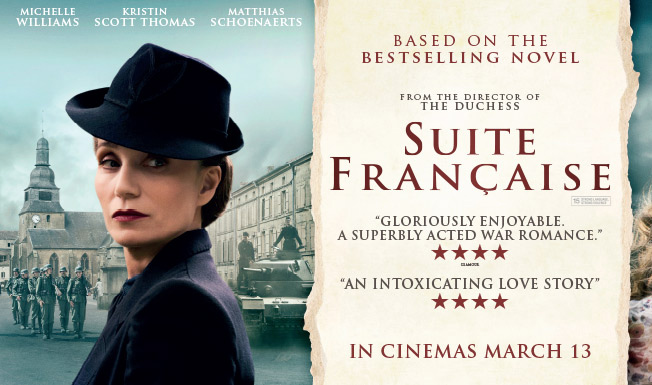
Suite Francaise Review
Much about Saul Dibb’s interpretation of Irène Némirovsky’s bestselling novel Suite Francaise – adapted for the screen by Matt Charman and Saul Dibb – will look and feel familiar. In a genre as overloaded as that of WW II films, it is difficult to come up with anything that doesn’t. What is unusual about this film, however, is the perspective that it tells its story from.
Set during the early years of the German occupation of France, Suite Francaise portrays life in the small town of Bussy, where Lucille Angellier (Michelle Williams) and her mother-in-law Madame Angellier (Kristin Scott Thomas) anxiously await news from their husband and son. Following the departure of most of the men to the front, Bussy is a town mostly inhabited by women, the absence of young, able-bodied men being the most obvious sign of a war that otherwise hasn’t quite reached rural France yet. Things change abruptly when large groups of refugees from Paris stream into Bussy, followed by a regiment of German soldiers who make themselves at home in the villagers’ houses. Moving in with Lucille and Madame Angellier is Bruno von Falk (Matthias Schoenaerts), a kind-hearted former composer turned commander. Romance quickly blooms between Lucille and Bruno when they discover that they not only have their unhappy marriages but also their love for music in common.
The significance of music is obviously written into the film’s title, Suite Francaise being the soundtrack’s central piano piece. It connects the two main characters as a means of communication long before words do, and the way that Rael Jones has worked the piece into the soundtrack is impressive and atmospheric. Even in the most threatening moments, the soft piano sounds have a calming effect not only on Lucille but also on the audience that sympathises with her predicament. Audience engagement with the various characters, although not an exercise in subtlety is, in fact, what makes Suite Francaise the gripping and compelling film that it is. We have seen war romances, Nazi occupation, deportation and violence before. However, it is the particular set of characters that this film throws together in this specific environment that achieves something new. Not only is this a story told mostly from a female perspective. It also shows people far away from the front, in a small, rural community where everyone knows everybody else’s secrets. That doesn’t mean that they stick together. Rather, the obvious distance between the rich landowners and their poor tenants not only is a source for conflict. It is also an opportunity for the film to show how people at opposite ends of the social spectrum experience the threat of the German occupation. While those in positions of privilege are able to rid themselves of the officers that have invaded their homes, those not so fortunate live under constant threat, a dilemma that is exemplified in a plotline centred around farmer Benoit (Sam Riley) and his family who have the German commander Kurt Bonnet (Tom Schilling) imposed on them after the Viscount of the town (Lambert Wilson) has Bonnet removed from his own home. Bonnet is the archetypal leering Nazi soldier, a clear and obvious menace to Benoit’s wife (Ruth Wilson). The film craftily builds up the tension between Bonnet and the family to its inevitable breaking point.
The cast do impressive jobs and almost every face is familiar, including those of German actors Alexandra Maria Lara and Heino Ferch who have appeared in previous war epics (Downfall, for one, should be familiar to English viewers). Interestingly, while Lara’s character stays very much on the side-lines, it will be clear to anyone with a little bit of background knowledge that her story is that of the author of Suite Francaise, Irène Némirovsky, whose conversion from Judaism to Catholicism ultimately failed to save her from the Nazis. Michelle William’s acting seems a bit wooden at first. To be fair, the character of Lucille – frightened and confused as she initially is – doesn’t leave the actress that much room for exploration. It is only later on, when exposed to the harsh realities of her new situation that both Lucille and Williams seem to come into their own. Lucille’s costume craftily reflects her transition from a frightened young wife struggling under her formidable mother-in-law into a woman whose ultimately brave choice earns her not only Madame Angellier’s respect but also leads to what feels like the film’s rather abrupt conclusion. Ultimately, however, it is Kristin Scott Thomas who towers above all. Not only is Madame Angellier an imposing and rather intimidating figure, but Thomas portrays her with poise and absolute plausibility. In fact, the relationship between Lucille and Madame Angellier turns out to be one of the most interesting and surprising aspects of the film.
The one thing Suite Francaise decidedly doesn’t need is Lucille’s voice-over. Communication between the characters happens without any redundant words which makes for a refreshing change and allows the actors to explore their parts in different ways. While probably a reflection of the narrative style of the novel, the voice-over seems intrusive and, at worst, states the obvious, while also giving the film an added on conclusion that it really doesn’t need.
In terms of narrative style or plots, Suite Francaise may not offer much that is new. However, it deserves praise for its outstanding cast and fresh perspective. The story of a distant, rural community told mainly through the eyes of women may just be something cinema audiences have not come across too many times in this genre before.
Suite Francaise opens in cinemas across the UK on 13th March 2015.
Anne Korn

